2023 Update
Americans Voice Strong Support for Free Speech, Noisy Petition and Assembly
Faith in religion remains strong, but doubts about the press.
Where America Stands on the First Amendment
Free speech is increasingly Americans’ most valued First Amendment freedom, but there are limits to what they know and accept, particularly among younger people. We explored what Americans believe about the five freedoms – and why.
- Six in 10 Americans know the First Amendment protects hate speech, but 40% would ban it, especially younger people.
- Nearly two-thirds say business owners should not be forced to bake a cake or create a website message – two scenarios that went to the Supreme Court – celebrating a cause that violates their religious beliefs.
- More than a third of Americans don’t realize the First Amendment protects books, movies, music, art and internet memes as free expression.
- Just one-third of Americans want politicians to have significant input over what’s taught in classrooms, with most preferring decisions by parents, teachers and students.
- More than two-thirds of Americans support the right to heatedly petition the government and to speak up at public meetings.
But overall, 93% of Americans consider the First Amendment vital.
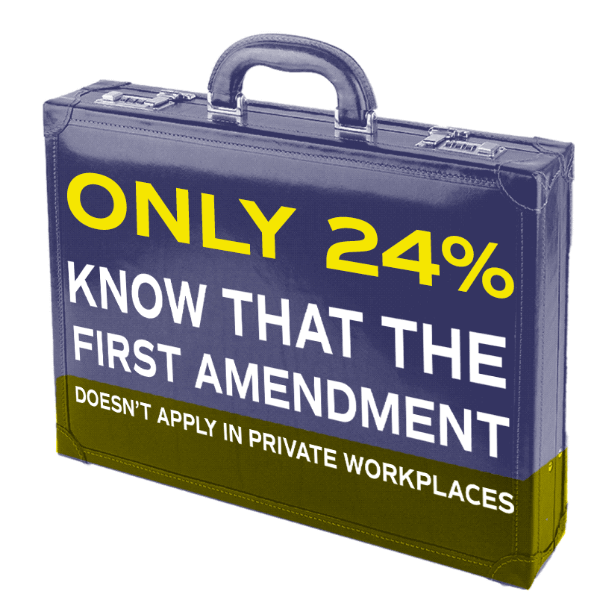 A March 2023 survey of 801 respondents found that 93% consider the First Amendment vital. This is consistent with the 2020 and 2022 “The First Amendment: Where America Stands” surveys conducted by the Freedom Forum, a nonpartisan, nonprofit organization dedicated to fostering First Amendment freedoms for all.
A March 2023 survey of 801 respondents found that 93% consider the First Amendment vital. This is consistent with the 2020 and 2022 “The First Amendment: Where America Stands” surveys conducted by the Freedom Forum, a nonpartisan, nonprofit organization dedicated to fostering First Amendment freedoms for all.
Similarly, a consistent majority (64%) say they would vote to ratify the First Amendment again today.
When asked to choose whether the First Amendment should never be changed, 62% said it should not. That’s up from 54% in 2020. However, more leaned toward thinking the First Amendment goes too far in the rights it protects: 7% compared to 3% in 2022.
A Common Misconception:
Most Americans do not know that the First Amendment applies only to the government limiting rights. Just under one-quarter (24%) know that private workplace policies are not bound by the First Amendment.
While overall awareness of the First Amendment remains high (95%), awareness of each of the five freedoms protected by the First Amendment – religion, speech, press, assembly and petition – has dipped slightly since 2020. The ability to name First Amendment freedoms and to identify them from a list of options have both decreased.
Religion: Americans favor protecting personal belief over preventing discrimination
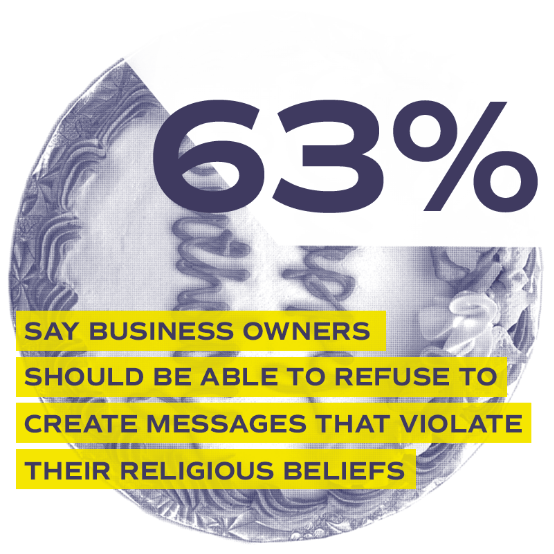 With 64% able to identify it, religion is the second best known First Amendment freedom after freedom of speech. Few (11%) consider it the most essential First Amendment freedom. The younger the respondent, the less likely the person is to consider religion the most valuable among the freedoms.
With 64% able to identify it, religion is the second best known First Amendment freedom after freedom of speech. Few (11%) consider it the most essential First Amendment freedom. The younger the respondent, the less likely the person is to consider religion the most valuable among the freedoms.
Americans appear equally divided over whether businesses, in principle, should be required to fulfill customer requests that violate business owners’ beliefs. One in four people are undecided.
When presented with a more specific scenario, though, respondents valued protecting personal religious convictions over preventing discrimination.
When asked if a baker or website designer should “be able to refuse to create a message that celebrates an occasion, cause, or event that violates their religious beliefs,” nearly two-thirds (63%) say yes.
Of those, when presented with four possible reasons for this view, about half (49%) say that discrimination must be prevented, but not in a way that compromises religious convictions. A further 39% see a difference between refusing to create a message and discriminating against an individual.
Among the 37% who say the baker or designer should not be able to refuse service, half say the creator should not be able to refuse service because businesses should serve all customers. A further 31% say that freedom from discrimination is more important than freedom of religion.
Speech: Americans don’t realize just how much their most valued freedom protects.
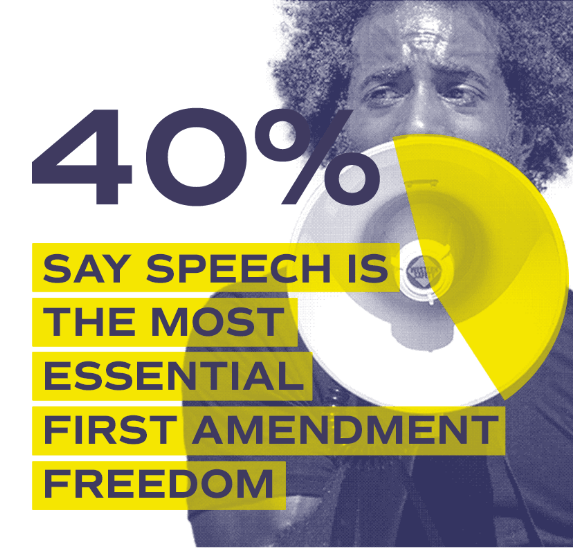 Freedom of speech is the best known and most valued First Amendment freedom.
Freedom of speech is the best known and most valued First Amendment freedom.
Forty percent say it is the most essential First Amendment freedom. In a first for the “Where America Stands” survey, this surpasses the proportion who say all five freedoms are equally essential (37%). Speech was identified as most essential by 33% of respondents in 2020 and 37% in 2022.
Nearly all (91%) can identify it as a constitutional right.
What is speech?
Freedom of speech protects more than the literal words we say; it also protects artistic expression from government censorship.
Half or more of Americans know that books, music, movies and music videos are protected by the First Amendment as types of speech. Fewer identify paintings, sculptures and internet memes as protected by the First Amendment. Thirty percent of respondents mistakenly say none of these types of expression are protected by freedom of speech.
However, 59% (up slightly from 53% in 2020) know that flag burning is a protected form of expression. Yet 59% erroneously say public school students can be required to recite the Pledge of Allegiance. They cannot; the First Amendment also protects the right not to speak.
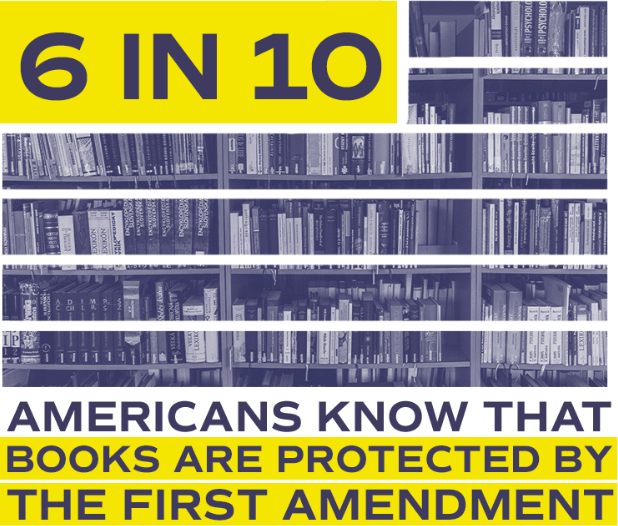
Who can decide what information is taught in public schools?
In 2022, a majority (57%) said “there is no appropriate reason to ban books” from being taught in classes or available in the library at middle and high school levels.
Those who said removing books may be OK cited content about gender, sex, violence or race as reasons for limiting access to those books. New survey questions for 2023 reveal that Americans believe decisions about teaching topics related to sex, gender and race are best resolved by those closest to schools and are more distrustful of decisions made by policymakers.
More than half (56%) say parents should have significant input over curriculum on these topics, with 47% identifying teachers as key.
About one-third suggested students, school administrators, school boards or community members as important for providing input on teaching topics. Younger respondents were most likely to believe students should have input.
Fewer than 30% say state legislatures or governors should have significant input.
Courts continue to consider the First Amendment rights of students, parents and educators, along with the government’s need to provide education, in weighing debates about curriculum.
How important is free expression on campus?
It is increasingly important to Americans that college campuses foster the free exchange of ideas, even if those ideas are offensive to some: 66% hold this sentiment compared to 59% in 2020.
However, younger respondents are least likely to agree, and members of Gen Z are least likely to say the First Amendment is extremely vital overall compared to older generations.
Should hate speech be considered free speech?
Nearly 6 in 10 (60%) Americans know that the First Amendment protects even speech that could be offensive or hateful.
However, a growing proportion since 2020, 40%, say preventing hate speech is more important than protecting free speech and that hate speech should not be protected.
This group is largely united about why hate speech should be limited. From among four options, a slight majority, 54%, say hate speech can expose targeted groups to discrimination, abuse and/or violence. A further 28% say it denies the values of tolerance, inclusion and diversity, and 14% say it fosters exclusion.
Speech vs. Conduct:
While the First Amendment protects even hateful speech, in many cases, discriminatory, abusive or violent behavior can be illegal.
Among those who would ban hate speech, almost 7 in 10 (68%) say determinations about what constitutes hate speech should be made at the national level, with 39% suggesting the Supreme Court should have the final say. Just 15% suggest state-level decisions about hate speech and 4% want local control.
Who Favors Limiting Hate Speech?
Women, people of color and younger people were more likely than older white men to favor limits on offensive or hateful speech.
Six in 10 Americans say hate speech should remain protected by the First Amendment. Asked to choose which reason why, 45% say hate speech is a matter of interpretation, so regulation would lead to selective enforcement by whoever happens currently to be in power. A further 21% say the best response to objectionable speech is more speech, and 15% say hate speech standards could change over time.
Press: Americans are divided over whether the press protects or threatens liberty.
About 6 in 10 (61%) Americans can identify press as a First Amendment freedom. Just as many also say it’s important for the news media to be a watchdog on the government.
In 2022, respondents were evenly split over whether the press fulfills this role effectively, with 37% saying it does, 37% that it does not and 25% unsure.
This year, survey respondents answered whether they believe today’s media is a protector of or threat to our liberty. Just over one-third (36%) leaned toward feeling the press is a protector of liberty compared to 21% who view it as a threat. A further 42% did not lean strongly either way.
Of respondents who say they see the press as a threat to liberty, 41% believe the news media is politically biased, and 34% say it reports based on corporate self-interest.
Among those who see the press as a protector of liberty, equal proportions of about one-third each say the press:
- Uncovers and exposes truth we wouldn’t otherwise know about.
- Helps people be as informed as possible.
- Holds the government accountable.
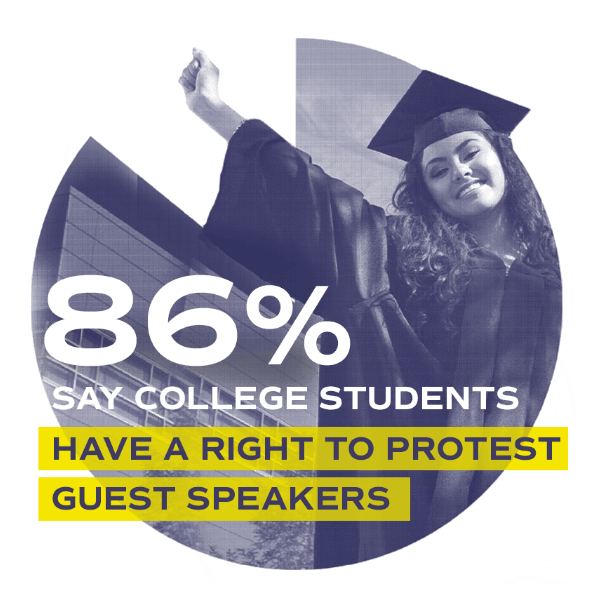
Assembly and Petition: Americans support heated dissent at public meetings.

2020 remains the most active year for “Where America Stands” survey respondents to have used their freedoms of assembly and petition.
In 2023, awareness of these rights has decreased. This year, 57% of respondents recognized assembly as a First Amendment freedom, down from 67% in 2020. Petition remains the least likely to be correctly identified as a fundamental freedom with 41% of respondents able to do so.
Protest at schools
Most Americans (86%) know that college students may protest invited speakers on campus. However, 68% of Americans falsely believe school administrators can limit high school students’ rights to protest on public school grounds simply because the administrators don’t like the cause.
Speaking out at public meetings
In 2022, more than three-quarters of respondents (76%) supported the right to criticize public officials at meetings.
This year, new questions further explored petitioning the government at public meetings.
Most (68%) say that irrespective of the opinion voiced, everyone should be able to speak at a public meeting subject to reasonable rules and time constraints, and 17% prefer access for all with no time limits.
A small minority (10%) would be open to banning or escorting certain speakers out of public meetings to maintain decorum, and 5% would ban all public comments at meetings due to the messiness of civic debates.
Nearly 4 in 10 (38%) say they’re glad when they see others expressing anger at the government while petitioning. While a further 31% don’t wish to petition themselves, they say they appreciate the right of others to petition, even angrily. Just 12% said they dislike angry public comments or want them banned, with a fifth unsure.
Questions about this year’s survey and/or requests to speak with a Freedom Forum expert may be directed to [email protected].
Methodology
This report offers an overview of the publicly released Where America Stands survey results, which, along with proprietary results, will help guide the Freedom Forum’s new and ongoing initiatives to help the public know, understand, value and defend our First Amendment freedoms.